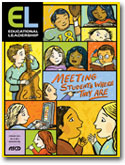The writers in this issue of EL encourage teachers to accept kids of all varieties and abilities, understanding that helping students learn requires "different strokes for different folks"—a nudging encouragement for some, creative teaching strategies for others. The message is, "If they don't learn the way we teach, teach them the way they learn."
Perhaps this message has a corollary for teacher learning. Shouldn't principals also "meet teachers where they are" as they seek to improve instruction? Can principals relate to teachers with the same understanding we want teachers to use with children? Doesn't the "walk your talk" cliché apply?
A few teachers—very few in my experience—need straightforward directives regarding improprieties in their teaching. Disrespect toward children, their parents, or other staff members is not acceptable and should be confronted directly. Blatant incompetency must never be tolerated. In these circumstances, principals must engage in difficult and direct conversations. Meeting teachers where they are does not suggest, in any manner, shape, or form, that we accept behavior outside high professional standards.
Most of the teachers I have met, however, are committed to serving children. But individual teachers, like the kids in their classrooms, come with their own personal stories, levels of competence, and feelings of passion for their work. We have teachers who excel, others who have just begun, and some who have "been there, done that" and need new challenges. Some do well in one area and struggle with another. They are as distinct, in fact, as the students they teach! But most are willing, albeit sometimes a bit apprehensively, to try new approaches, renew their vigor, and improve. The job of principal is to "meet teachers where they are" and move them, step by step, toward improvement.
From Perception to Reality
Teachers who are regarded as competent professionals and whose strengths are affirmed tend to get even better in the very areas in which they are affirmed. The opposite is equally true. Teachers who are perceived as incompetent, who sense disrespect, and who receive constant negative messages about how they need to improve, perceive themselves as unappreciated and misunderstood. They retreat to emotions of anger, resentment, and negativity. Cooperation becomes mere compliance, and suggestions from their principals are perceived as "gotchas." These attitudes can easily become pervasive, and teachers begin responding to their own students with the same negativity they have experienced.
- Call a teacher at home during school hours. Leave a voice message saying something like, "Thanks for your extra tour on bus duty today. I know kids are safe when you are there. I appreciate you!"
- Conduct walk-throughs carrying a sticky note pad. Leave a note stuck to a plan book complimenting the teacher: "Good to see your planning is so thorough. Seems you are right on target."
- Copy a journal article about an effective teacher and put it in a teacher's mailbox with a note: "This sounds like you!" or "You could have written this one."
- At a faculty meeting (without mentioning specific names) say, "It's great to see so many of you out in halls during class changes!" or "Thanks to those who were able to come to Tuesday's parent meeting!"
- Ask teachers who attend professional development days to present for other faculty. Teachers often pay more attention to their peers than to expensive consultants.
- Encourage professional development. It is imperative that teachers continue to have opportunities to learn.
- Take some risks yourself. This encourages teachers to do the same. And if the risk you take fails, it gives teachers permission to learn from their own mistakes.
- Offer to teach a class for a teacher so he or she can observe a colleague. Facilitate the conversation between the two.
- Walk the building with the determination to see the "good stuff." Affirm at every opportunity.
Valuation over Evaluation
We live in an era of accountability, and accountable we will be. However, accountability must include deep respect for those with whom we work. Our expectations are high, not because of some external pressures from state agencies or media hype, but because of the needs of our students. This, and only this, is the ultimate barometer for judging our work.
As much as teachers need evaluation, they need "valuation" even more. Meeting teachers where they are means valuing who they are and celebrating the importance of their work.

